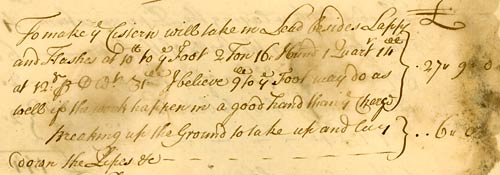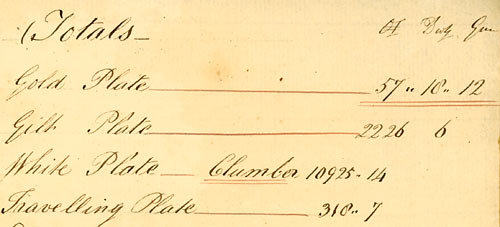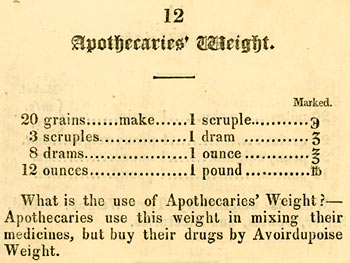Weights
The Imperial system used in England and Wales involved three main types of weight measurements, used for different things:
- Avoirdupois weight
- Troy weight
- Apothecaries' weight
The standard measure of weight in each was the pound (lb). The abbreviation 'lb' comes from the Latin word for pound, 'libra', which was also used for the monetary pound (£). Pounds were divided into ounces (oz).
However, many commodities were sold according to their volume or capacity, rather than according to their weight. Specialist terms used to describe quantities of produce often refer to the containers in which they were usually sold, and not to how much they weighed.
For instance, a container for tea was a 'caddy'. This contained tea weighing one and a third pounds.
Vocabulary also varied between different regions of the British Isles. Dictionaries and specialist works on archaic weights and measures should be consulted by researchers who wish to know what weight was meant by these quantities.
Avoirdupois weight
This was used to measure large and bulky items, and was the most common weight measurement, eventually becoming the standard for virtually all weights. The smallest unit was the dram or drachm. This system is still used by many people in the UK to measure their own weight (stones and pounds, or pounds and ounces for babies).
Table of units of measurement:
| Measurement |
Equivalent |
| 16 drams |
1 ounce (oz) |
| 16 ounces |
1 pound (lb) |
| 14 pounds |
1 stone (st) |
| 2 stones |
1 quarter (qtr) |
| 4 quarters |
1 hundredweight (cwt) |
| 20 hundredweight (2240 lb) |
1 ton |
The ton was sometimes called the Long Ton to distinguish it from the American ton, which equated to 2000 lb.
In this 1723 proposal to make a cistern, it is stated that 'To make the Cistern will take in Lead Besides Lapps and Flashes at 10lb to the Foot 2 Ton 16 Hund. 1 Quartr 14 lb'.

Detail from proposal to make a cistern, 1723 (Pl C 1/389)
Troy weight
This was used to measure small amounts of gold, silver, metals and gemstones by silversmiths or jewellers. Use of the Troy pound was abolished by the Weights and Measures Act of 1878, but the Troy ounce is still used to measure precious metals and stones. The smallest unit in the Troy weight system was the grain.
Table of units of measurement:
| Measurement |
Equivalent |
| 24 grains |
1 pennyweight (dwt) |
| 20 pennyweight |
1 ounce (oz) |
| 12 ounces |
1 pound (lb) |
A troy pound, at 5760 grains (about 373.24 grams in the Metric measurement), was lighter than an avoirdupois pound, at 7000 grains (about 453.59 grams).
In this example from the Newcastle Collection, the weights of gold plate are given in the Troy measurements of 0£, Dwt and Grn.

Detail from inventory of plate, 1791 (Ne 5 I 1)
Apothecaries' weight
This was a version of Troy weight, used by apothecaries or pharmacists to measure out their powders. Pounds and ounces weighed the same as their Troy equivalents, but different units were used for the lighter weights. The smallest unit was the grain.
Table of units of measurement:
| Measurement |
Equivalent |
| 20 grains |
1 scruple |
| 3 scruples |
1 dram or drachm |
| 8 drams |
1 ounce (oz) |
| 12 ounces |
1 pound (lb) |
Apothecaries' measures were officially abolished by the Weights and Measures Act of 1978.
This table of Apothecaries' Weight, from a schoolbook published in 1822, shows its particular abbreviations.

An Explanation of the fundamental rules of arithmetic, 1822 (Briggs Collection, LT 210.QA/E9)
Metric weight
Table of units of measurement:
| Metric weight |
Equivalent |
| 1,000 milligrams (mg) |
1 gram (g) |
| 1,000 grams (g) |
1 kilogram (kg) |
| 1,000 kilograms (kg) |
1 tonne |
Note the different spelling of 'tonne' from the Imperial 'ton'.
Next page: Measurements